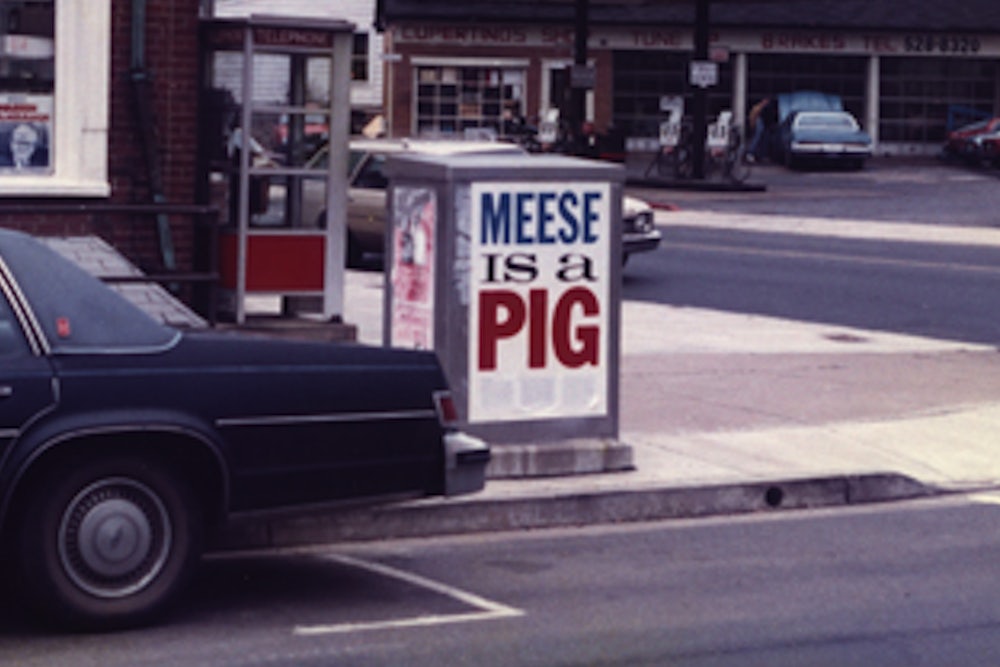Edwin Meese III is back in the news: According to a report in Sunday's New York Times, the Reagan-era attorney general convened a group of right-wing leaders last winter to plan a campaign to kill Obamacare—by shutting down the government, if necessary. The apparent end-of-the-fiscal-year train wreck, according to Sheryl Gay Stolberg and Mike McIntire's story, was planned months ago.
Meese's return to the headlines is bad news for the country, and likely bad news for his fellow Republicans, whose efforts to blame President Obama for the shutdown might be undercut by news that a secret cabal of veteran Beltway insiders plotted the shutdown months ago. But for people who lived in Washington in the 1980s, it brought with it a certain sweet nostalgia: Few government officials ever represented better targets for mockery.
For people who followed politics, of course, Meese was the guy behind some of Reagan's most divisive policies. But ordinary commuters also experienced the Meese-bashing in ways they didn't with other officials: During the last couple years of the Reagan administration, walls, construction sites, traffic signal boxes, and highway overpasses throughout the Washington area were festooned with giant posters that read "Meese is a Pig." Soon afterwards, a second series of the poster appeared, with an additional two words: "Experts Agree!"
The campaign, in turn, drew ample national media coverage and represented something of a cultural moment—a pre-web meme of sorts. Stores began selling T-shirts bearing the same message.
Now, with Meese's allegedly porcine mug gracing the front of the paper of record again, I reached out to Jeff Nelson, the man behind the original poster campaign. "Meese did all he could to obstruct justice in the Iran-Contra scandal, and he also helped block action to ban plastic guns, which could pass undetected through metal detectors," Nelson, now 51, recalls. " I was so angry, and as a lone citizen I felt so powerless."
It's the sort of sentiment that sends people to their laptops nowadays. Nelson and his cohort had to work a bit harder at it. "There were no things such as blogs and tweets," he says. "Things were much more regional and getting in the National news was a really big deal. At that point I had been silk-screening posters for several years, mostly for bands I played in, using rudimentary homemade equipment in the leaky garage of our rented house. I was so angry that I decided to do a big poster campaign against Meese, and bought the largest paper I could find."
Smaller print on the posters included a lengthy list of reasons for the declaration, which included ill-treatment of AIDS patients and efforts to weaken Miranda rights, as well as Meese's role in the Iran-Contra affair.
Friends from the local music scene helped print and paste an initial run of 250 posters. "It took big teams of people and lots of coordinating to put these posters up all over the Washington, D.C. area in one night, and a number of us got caught by the authorities," says Nelson. But the reaction was good enough that he rolled out the second, updated version. "I remember being quite gleeful and giddy at how great the final product looked, with its ridiculous (but also quite accurate) message. My friends and I did a much larger run this time, and hand-printed about 750 posters."
Eventually, the authorities caught up with Nelson. While he was waiting for a court date, he decided to move from secret postering to t-shirt sales: "It ended up becoming a very successful campaign in itself. At one point, a bicycle messenger named Christopher Stalvey was denied access to the Justice Department for wearing one of these shirts, and the ACLU then threatened to sue the Justice Department for its policy regarding the shirt. Everyone was convinced we had engineered the whole thing, but we had nothing to do with it—the whole thing had a life of its own at that point. I ended up selling about 6,000 of the t-shirts, which more than paid for the thousands I’d spent on paper, ink, rollers, and wheat paste, and helped pay for some of my first proper printing equipment."
Last year, an example of one of Nelson's posters appeared in a Corcoran museum exhibit of Washington vernacular art. Alas, Meese, as described in the Times story, is no museum piece. "I knew that Meese never went away, but only now--with the rise of the Tea Party--is he able to shine in his own particular extreme right-wing way once again," says Mark Andersen, who took part in the nocturnal postering group. Andersen says there are no plans for new t-shirts, though.
